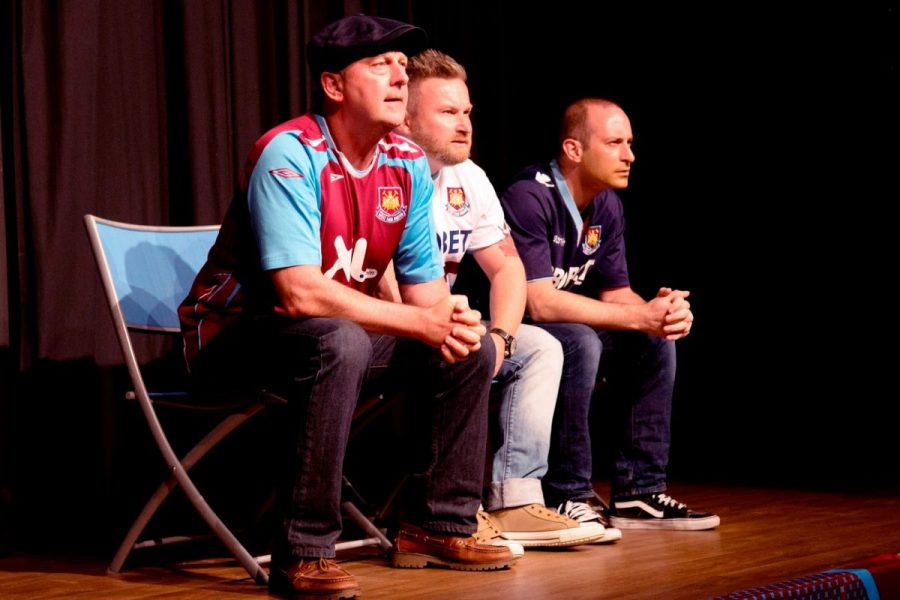Irons takes the macho world of traditional football fandom and throws a firework into it – what happens to a group of three footy “lads” when one of them comes out as a transgender woman? It’s an interesting angle for a football play to take, and is treated here with a degree of frivolity, rather than as an entirely serious exploration of gender issues and the human psyche. The three acts of the play are set in the stands on successive match days. In the first, one of them, Ash, hints he is going for an operation; in the second he turns up as a she, Ashleigh, to the consternation of the other two; in the third, we learn the fate of their relationship, and of West Ham’s season. It’s an odd situation in which to come out as transgender, but in keeping with a world in which men are more comfortable talking about the tackle on the pitch than the tackle in their pants.
The trio – Paul Spires, Steve Owles, Warren Palmer – are perfect for this. This is not a case of actors “doing” football; these are genuine fans. There’s a depth of knowledge to writer/director Colin Chaston’s work you can’t fake. It shows itself in the chants, the references to players and historic events. You might not need to be a fan to know the old chestnut about West Ham winning the World Cup in 1966, but you’d have to be Hammers mad to give much of a hoot about Frank McAvennie‘s goal scoring stats. The way the cast mime shuffling past fellow supporters on their way to the loo or the bar speaks of years spent on the terraces.
In fact, the balance between football and relationships is probably too heavily in favour of the former, considering the play is ostensibly about the latter. There’s more chanting and commentary than is needed to set the scene or drive the subplot of West Ham heading for Premiership glory. A lot of dialogue is, in terms of this play, wasted dissecting on-pitch action. Some work is also needed to synch up the actors’ reactions with the sound effects. Cheering a goal before or after the sound effects kick in spoils the illusion.
The tone of the play is not fully set until act two. Until then it could still potentially turn serious and psycho-analytical. But there is a touch of Carry On to the way these two alpha males don’t realise who the woman taking Ash’s seat is, and their eventual reactions are fairly superficially blokey – they don’t want to hang out with a woman at football, they fret about whether she does or doesn’t fancy them. It’s a light-hearted treatment of the topic, but there’s room for more shock, disbelief and threat to register in the eyes of the men. The final act also only resolves things on a superficial level, never really probing the full depths of confusing emotions that Ashleigh’s friends would have. A sub-plot in which one fella appears to be having an affair with another’s wife comes to a satisfying conclusion, however.
Irons is fun and accessible, the kind of play that could tour football clubs and community theatres to sow a few seeds about judgement and prejudice. There’s much more to explore about the relationship football has with gender and sexuality, of course, but this broaches the topic in a manner that could reach out to a casual audience, without getting too heavy.
